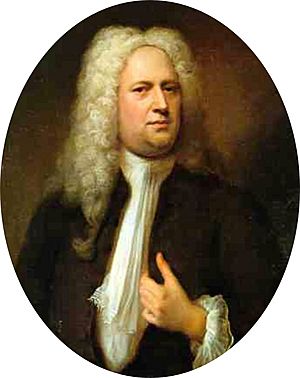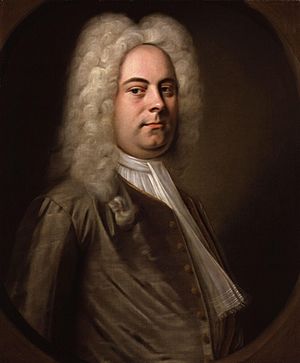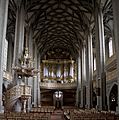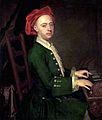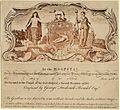George Frideric Handel facts for kids
George Frideric Handel (born Georg Friedrich Händel in Germany) was a famous composer. He was born in Germany on February 23, 1685. Later, he moved to England and became a British citizen. He changed his name to George Frideric Handel.
Handel and another great composer, Johann Sebastian Bach, were born in the same year. They were both very important musicians of their time, but they never met. Handel wrote many operas and oratorios, which made him very famous. He traveled a lot, especially to Italy, where he learned a lot about writing music.
Some of Handel's most famous works include the oratorio Messiah, the Water Music, and Music for the Royal Fireworks. He wrote over 42 operas and many other types of music.
Contents
Handel's Life Story
Early Years in Germany
Handel was born in Halle, a city in Germany. His father was a barber and a surgeon. Handel started playing music when he was very young. He played the harpsichord and the organ. When he was seven, he got a clavichord and practiced it secretly in the attic.
By age nine, he was already composing music! His teacher was Friedrich Wilhelm Zachow, a church organist. Handel learned to play the organ, harpsichord, and violin. He also studied composition and harmony.
Handel's father wanted him to become a lawyer, not a musician. Even after his father died in 1697, Handel studied law for a year at the University of Halle in 1703. But he was not happy studying law. He decided to follow his passion and become a musician.
He became an organist at a church in Halle. The next year, he moved to Hamburg. There, he worked as a violinist and harpsichordist in an opera orchestra. His first two operas, Almira and Nero, were performed in 1705.
Learning in Italy
Handel wanted to learn more about opera, so he traveled to Italy in 1707. He stayed there for four years. His opera Rodrigo was performed in Florence in 1707. His opera Agrippina was performed in Venice in 1709. Agrippina was a huge hit, performed 26 times, and it made Handel famous. He also wrote church music and other pieces in an operatic style, like Dixit Dominus.
Moving to England
In 1710, Handel became the music director (called Kapellmeister) for George, the Elector of Hanover. This George would soon become King George I of Great Britain. The Elector allowed Handel to visit London for 12 months.
Handel's opera Rinaldo was performed in London in 1711. It was the first Italian opera performed in England and was an instant success. Handel returned to Hanover for a year, writing chamber and orchestral music. He also started learning English.
In 1712, he got permission to visit England again. He had rich supporters (called patrons) who gave him money. Queen Anne gave him £200 a year, which was a lot of money back then. Because he was so successful, Handel decided to stay in England instead of going back to Hanover.
When Queen Anne died in 1712, the Elector of Hanover became King of Great Britain. This meant Handel's old boss was now the King of England! There's a story that Handel wrote his Water Music for a royal boat party on the River Thames to get the King to forgive him for staying in England. This story is probably not true. The King actually doubled Handel's salary! Later, his salary increased even more when he taught music to the Queen's daughter.
In 1724, Handel moved into a house at 25 Brook Street, London. He lived there until he died in 1759. This house is now the Handel House Museum and you can visit it. Many of his most famous pieces, like Messiah and Fireworks Music, were composed there.
In 1729, Handel's opera Scipio was performed. The march from this opera is still used by the British Grenadier Guards today. The next year, Handel officially became a British citizen.
In 1731, Handel was asked to write four anthems for the coronation of King George II. One of them, Zadok the Priest, has been sung at every British coronation since then!
Handel spent most of his time working on operas. He managed the Royal Academy of Music, an organization that put on opera shows. He also worked with the King's Theatres and many of his operas were performed at the Royal Opera House in Covent Garden. He even traveled to Italy to find new singers for London. London became famous for its operas.
However, Handel also had rivals, like a composer named Bononcini. Handel eventually stopped managing operas in 1740 because he lost a lot of money in the business.
Later Years and Legacy
In April 1739, when he was 54, Handel had a stroke. This made his right arm weak for a while, so he couldn't perform. But he recovered well after six weeks at a health spa. Around this time, he started writing oratorios instead of operas.
In 1742, his oratorio Messiah was first performed in Dublin. It wasn't very popular in London until 1750. Then, it was performed to raise money for the Foundling Hospital Chapel. Handel performed it there every year, raising about £600 for the hospital each time. He spent most of his later years composing and producing oratorios. Judas Maccabaeus was another very popular one. Handel trained the English and Italian singers for these oratorios himself.
In August 1750, Handel was seriously hurt when his carriage overturned on a trip back to London from Germany. In 1751, he started to lose his eyesight. He died in London in 1759. The last concert he attended was his own Messiah.
More than 3,000 people came to his funeral. He was buried with great honors in Westminster Abbey. Handel never married and kept his personal life private. He left a lot of money, about £20,000, which was a huge amount back then. Most of it went to his niece, and some to friends, servants, and charities. His original music papers are now mostly kept in the British Museum.
Handel's Name
When Handel became a British citizen, he started using the spelling "George Frideric Handel." This is the spelling most often used in English-speaking countries. In Germany, his original name, Georg Friedrich Händel, is still used. In France, he is known as "Haendel." There was another composer named Handl, who was from Slovenia, but he is usually known as Jacobus Gallus. This can sometimes be confusing for people who list and organize music!
Images for kids
-
Handel's baptismal registration (Marienbibliothek in Halle)
-
Handel (centre) and King George I on the River Thames, 17 July 1717, by Edouard Hamman (1819–88)
-
"The Chandos portrait of Georg Friedrich Händel" by James Thornhill, c. 1720
-
Handel House Museum at 25 Brook Street, Mayfair, London
-
Interior of the Covent Garden Theatre in London
-
Caricature of Handel by Joseph Goupy (1754)
-
Uncompleted admission ticket for the May 1750 performance of Messiah, including the arms of the venue, the Foundling Hospital
-
A carved marble statue of Handel at the Victoria and Albert Museum, London, created in 1738 by Louis-François Roubiliac
See also
 In Spanish: Georg Friedrich Händel para niños
In Spanish: Georg Friedrich Händel para niños


